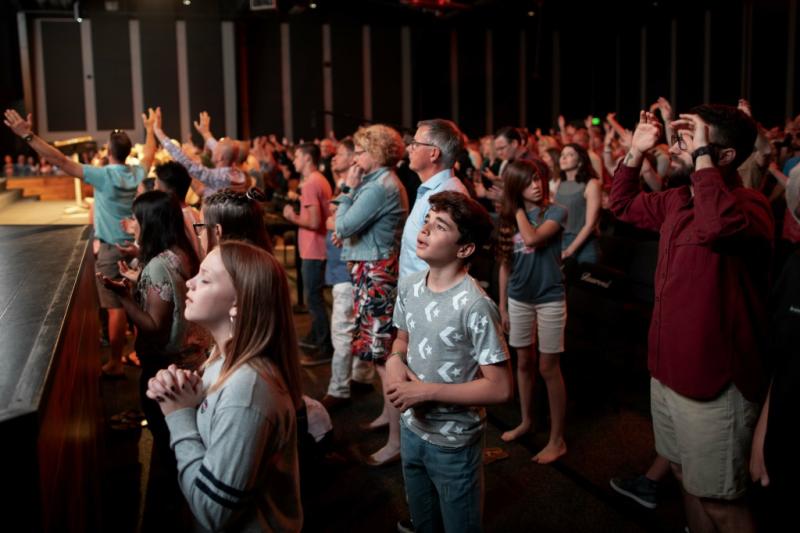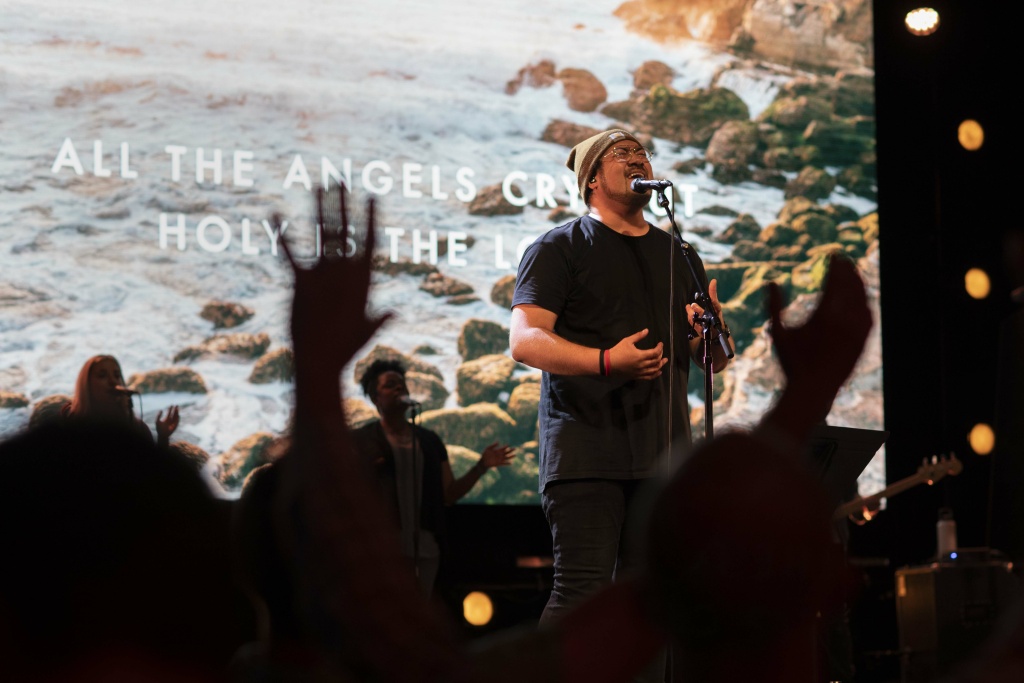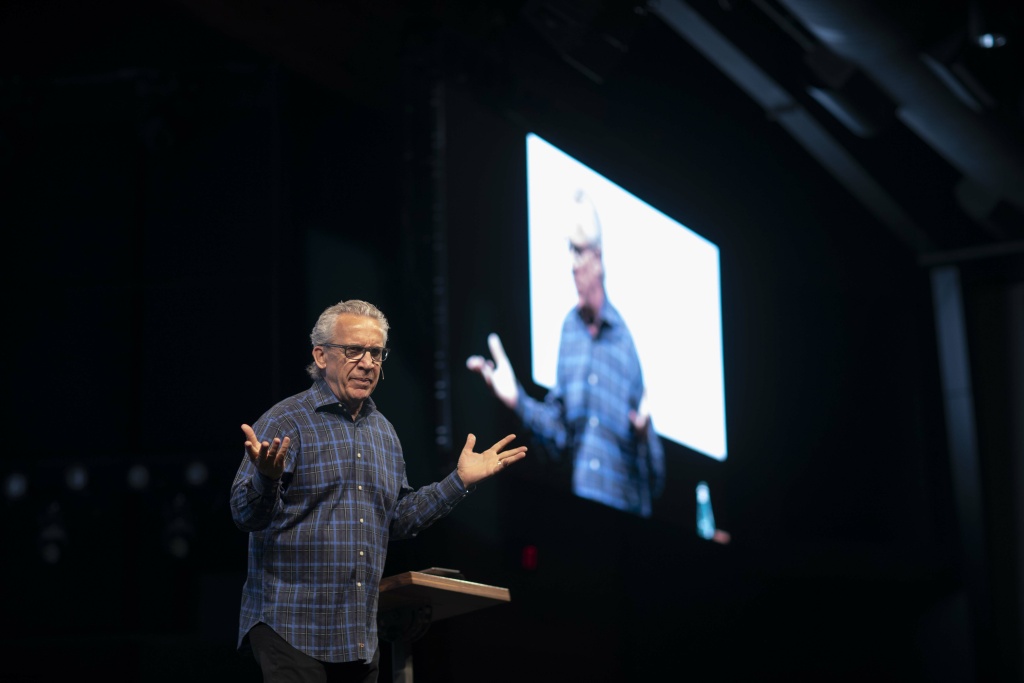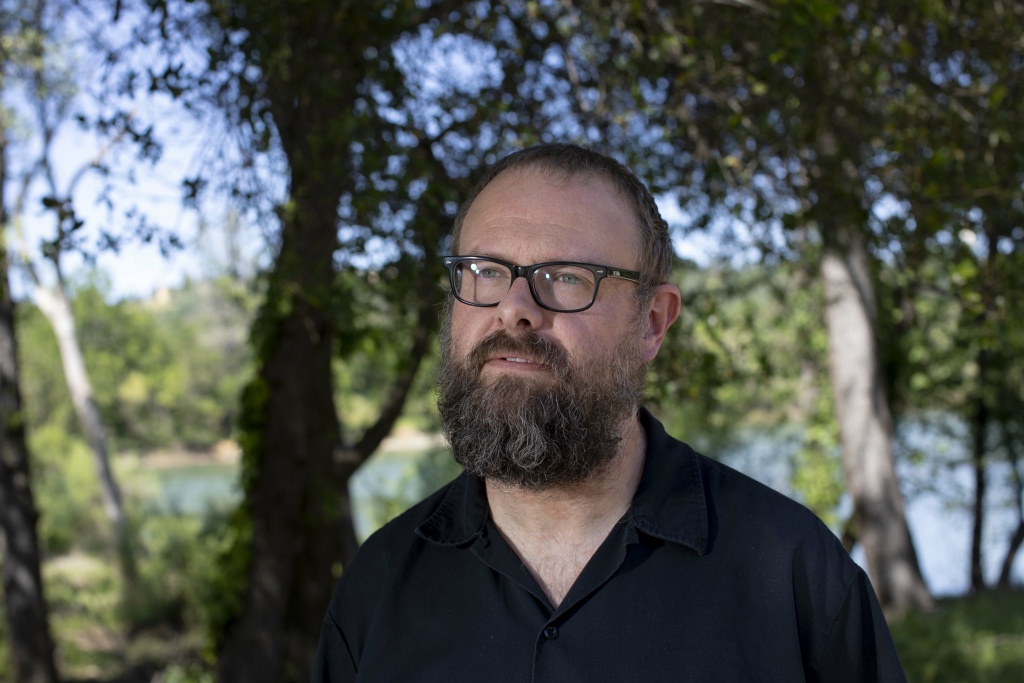How Redding, California, Became An Unlikely Epicenter Of Modern Christian Culture
By: Vanessa Rancano


This is an interesting story about a local church making itself into a global ministry. While I don’t agree with all of their theology they have been a positive influence for the area. They were heavily involved in the recovery from the Carr fire last year and have been an economic plus for our area. They also helped the city through the Great Recession. Now we have a strong economy and 3.5% unemployment rate. They have spread around the world from a single 800 member church in the late 1970’s.

God brought Golibé Omenaka to Northern California. The journey started in Manchester, England, when he encountered the teachings of a Redding-based megachurch called Bethel, and took off when a friend prophesied that God had called Omenaka to Bethel.
Specifically, God called Omenaka to the Bethel School of Supernatural Ministry, where the 24-year-old would undertake a spiritual transformation and be trained in miraculous healing.
In the two decades since the School of Supernatural Ministry’s founding, more than 10,000 people from around the world have made the same pilgrimage, turning Redding into an unlikely global epicenter of Christian culture.
 Dann Farrelly, Dean of Bethel School of Supernatural Ministry, delivers a lecture to a first-year class of about 1,200 students at the Civic Auditorium in Redding, CA, on April 29, 2019.Sean Havey
Dann Farrelly, Dean of Bethel School of Supernatural Ministry, delivers a lecture to a first-year class of about 1,200 students at the Civic Auditorium in Redding, CA, on April 29, 2019.Sean HaveyToday, walking around this former logging town of 90,000 residents, you can meet people from a dozen countries in a day. This year, the school graduated 2,500 students, representing more than 70 countries; the youngest was 18, the oldest 85.
It was founded by a fifth-generation pastor, Bill Johnson, who heads up local Bethel Church, and started with a few dozen local students. Today the school enrolls more international vocational students than any other school in the country, by far, according to Immigration and Customs Enforcement data. In 2017, Bethel had 1,792 international students enrolled. The institution with the next highest enrollment was Dean International, a flight-training school in Florida, with 888 international vocational students.
 Audrey Dukes, of Upland, CA, receives "healing prayer" from Henk Van Diest and his wife Marjolein Van Diest, who moved to Redding, CA, 3 years ago from the Netherlands in order to attend the Bethel School of Supernatural Ministry. Sean Havey
Audrey Dukes, of Upland, CA, receives "healing prayer" from Henk Van Diest and his wife Marjolein Van Diest, who moved to Redding, CA, 3 years ago from the Netherlands in order to attend the Bethel School of Supernatural Ministry. Sean Havey“We are a supernatural school. We believe that healing is for today,” says Leslie Crandall, who oversees first-year students.
Students are taught that God is actively at work in the world, and miracles did not die with Jesus; they’re taught that God can manifest his healing power through their prayers, according to students and leaders. “We believe that God is still speaking, and he can speak to his kids and he does,” Crandall says.
When Omenaka first encountered Bethel’s teachings back in England, he balked. “My internal response was this is the stupidest thing I've ever heard of in my life,” he says.
 “Healing prayer” sessions take place after every service at the Bethel Church in Redding, CA.Sean Havey
“Healing prayer” sessions take place after every service at the Bethel Church in Redding, CA.Sean HaveyA leader at his church in Manchester wanted him to go on something called a “treasure hunt,” a practice originated by Bethel. He was meant to search the streets of his city for people in need of healing. Guided by impressions from God, he would find strangers to pray for and, ideally, heal
YouTube is full of treasure hunters -- small groups, usually of young people, wandering the streets, airports and malls of the world asking to place their hands on strangers -- a Redding-born practice exported around the globe.
Omenaka grew up religious, still, the idea of modern-day miracles didn’t sit well with him at first. “I was afraid, to be honest,” he says.
But as he opened himself to the unfamiliar teachings, something shifted in him. “When you pray for a complete stranger on the streets, and they get healed of a leg injury, and they say, ‘What the heck have you done to me?’ that kind of changes the way you look at things.”
It changed things so much that Omenaka enrolled at the School of Supernatural Ministry. After eight years, he’s still in Redding. He met his wife here, and they have two kids. Now, he’s a pastor at the school.
Omenaka’s story is typical of students here. For most, it’s a far-flung brush with Bethel that draws them to Redding.
 BSSM students talk and do homework between classes outside of the Redding Civic Auditorium, which a Bethel-connected nonprofit manages for the City, on April 29th, 2019.Sean Havey
BSSM students talk and do homework between classes outside of the Redding Civic Auditorium, which a Bethel-connected nonprofit manages for the City, on April 29th, 2019.Sean HaveyBethel's influence goes far beyond its megachuch of 11,000 members and school with international pull. Bethel music is played around the world, and its studios have produced a handful of Billboard 200 hits the last decade.
Then there’s Bethel.TV, a subscription service that streams church services, e-courses and original shows produced by Bethel. Bethel’s weekly podcast has 20 million downloads a year; there are dozens of books written by Bethel leaders; several conferences each year, centered on everything from music to medicine, bring more than 25,000 people to Redding. There’s also Bethel’s tech school, K-8 school and art school, and its international leadership network, Global Legacy, created by a former top-level British prison executive.
 Musicians at the Bethel Church in Redding perform during Sunday service on April 28, 2019.Sean Havey
Musicians at the Bethel Church in Redding perform during Sunday service on April 28, 2019.Sean Havey“It represents a new form of Christianity that could reshape the global religious landscape for years to come,” write sociologists Richard Flory and Brad Christerson in The Rise of Network Christianity: How Independent Leaders Are Changing the Religious Landscape. Bethel and other neo-Charismatic powerhouses like it are untethered to traditional church structures or denominations. They’re savvy digital marketers who leverage the power of electronic communication to expand their reach, according to Flory and Christerson.
For those who flock to the School of Supernatural Ministry, proximity to Bethel’s vaunted spiritual leaders, Bill Johnson and Kris Vallotton, and the promise of direct access to the supernatural are a powerful draw. But many stay for the sense of community or spiritual growth.
 Bill Johnson, senior leader of Bethel Church in Redding, delivers a sermon during Sunday service on April 28, 2019.Sean Havey
Bill Johnson, senior leader of Bethel Church in Redding, delivers a sermon during Sunday service on April 28, 2019.Sean Havey“I came here thinking I will grow in my prophetic, I will do all kinds of miracles,” says Henk Van Diest. He and his wife sold their house in the Netherlands and moved their family to Redding to attend the school.
He enrolled for two years and spent three years volunteering in Bethel’s healing rooms, where people receive prayer. “I saw so many miracles,” he says, “but in the end, my relationship with God is the most important thing. It became more about my identity.”
The School of Supernatural Ministry is not accredited and doesn’t confer degrees, but each year thousands of students pay the $5,250 tuition for an unconventional religious education. The school is less about studying religion than living it in the world.
“It’s not only head knowledge, like rational,” Van Diest says. “It felt sometimes like open-heart surgery.” He and his wife plan to stay in Redding for a fourth year and are preparing to sell their real estate business in the Netherlands.
Flory, the director of research at the Center for Religion and Civic Culture at the University of Southern California, speculates that’s partly why, while religion is in decline, especially among younger people, this expression of neo-Charismatic Christianity -- Charismatic meaning emphasizing miracles and manifestations of the Holy Spirit -- is one of, if not the, fastest-growing forms of Christianity in this country and the world.
California is home to two of the world’s most prominent examples: Harvest International Ministry (HRock Church), based in Pasadena, and Bethel.
“California is not the only incubator of Pentecostal/Charismatic Christianity,” says Flory, “but it is one of the most important. There's less religious infrastructure that tells you what you can and can't do here.”
In general, Flory says, Pentecostalism is associated with specific denominations like the Assemblies of God, while Charismatic tends to refer to a more independent form of Pentecostal Christianity that exists beyond traditional denominational bounds. But both emphasize miracles, prophecy and other gifts of the Spirit.
In the popular imagination California may not be a particularly religious place, but there are more than 200 megachurches here (churches with regular attendance of more than 2,000 people), more than in any other state. Pentecostalism itself was born here. “California has, for everybody, been a land of opportunity, not just liberal hippie types,” Flory says.
Ultimately, Bethel wants to be more than a school with international pull, more than a megachurch. Flory says its objective is nothing short of cultural transformation.
He describes the leadership’s goal this way: “Let's get the right kinds of Christians in the right kind of public sectors of American society: politics, economics, Hollywood, etc., and then through their efforts we’ll bring about the Kingdom of God on Earth in the here and now.”
 Longtime Redding resident Donna Zibull hands out anti-Bethel stickers on April 29, 2019. Zibull is a member of the Facebook group Investigating Bethel. Sean Havey
Longtime Redding resident Donna Zibull hands out anti-Bethel stickers on April 29, 2019. Zibull is a member of the Facebook group Investigating Bethel. Sean HaveyBut some Redding residents don’t want to be part of the experiment.
“Redding is their test case of turning a city that is a democracy into a theocracy,” says Laura Hammans, a member of Investigating Bethel, a Facebook group with more than 1,000 members.
Hammans is one of a dozen members of the group meeting at a Redding park one afternoon. Another member, Donna Zibull, is passing out stickers that say, “Don’t drink the Kool-aid.”
“We've handed them out freely because we want to get the message out there,” Zibull says. “Some people are afraid to put them on their car.”
Afraid, she says, because the church’s influence feels like it runs through the core of the city. Redding’s mayor, Julie Winter, is a Bethel elder; Bethel paid the salaries of several police officers when the city couldn’t afford to; a Bethel-connected nonprofit took over management of the city’s civic auditorium and now holds Supernatural School classes there; Bethel’s influence was central to getting a direct flight from LAX to Redding approved last year; and there’s a $150 million Bethel expansion underway that will triple the church’s capacity and allow the school to grow by 1,000 students.
 Redding resident David Boone is a member of Investigating Bethel, a Facebook group with more than a thousand members. “You get this feeling that they know they're a sort of virus,” Boone says, “but they think they're the good virus that we all need.” Sean Havey
Redding resident David Boone is a member of Investigating Bethel, a Facebook group with more than a thousand members. “You get this feeling that they know they're a sort of virus,” Boone says, “but they think they're the good virus that we all need.” Sean HaveyFor some, the line separating church and state is hard to trace at this point, threatening the integrity of the city. “They have this really well-organized program to innervate everything with their influence,” says David Boone, another member of Investigating Bethel. “You get this feeling that they know they're a sort of virus, but they think they're the good virus that we all need.”
For many others, Bethel is a positive force, one that’s given the city a much needed economic boost, and made it more vibrant and diverse.
Either way, Bethel’s outsize influence on this little city is unavoidable. Redding has become a new kind of Christian mecca.
The California Dream series is a statewide media collaboration of CALmatters, KPBS, KPCC, KQED and Capital Public Radio, with support from the Corporation for Public Broadcasting, the James Irvine Foundation and the College Futures Foundation.
Tags
Who is online
68 visitors


It changed things so much that Omenaka enrolled at the School of Supernatural Ministry. After eight years, he’s still in Redding. He met his wife here, and they have two kids. Now, he’s a pastor at the school.
Omenaka’s story is typical of students here. For most, it’s a far-flung brush with Bethel that draws them to Redding.
Bethel's influence goes far beyond its megachuch of 11,000 members and school with international pull. Bethel music is played around the world, and its studios have produced a handful of Billboard 200 hits the last decade.
Then there’s Bethel.TV, a subscription service that streams church services, e-courses and original shows produced by Bethel. Bethel’s weekly podcast has 20 million downloads a year; there are dozens of books written by Bethel leaders; several conferences each year, centered on everything from music to medicine, bring more than 25,000 people to Redding. There’s also Bethel’s tech school, K-8 school and art school, and its international leadership network, Global Legacy, created by a former top-level British prison executive.
“It represents a new form of Christianity that could reshape the global religious landscape for years to come,” write sociologists Richard Flory and Brad Christerson in The Rise of Network Christianity: How Independent Leaders Are Changing the Religious Landscape. Bethel and other neo-Charismatic powerhouses like it are untethered to traditional church structures or denominations. They’re savvy digital marketers who leverage the power of electronic communication to expand their reach, according to Flory and Christerson.
For those who flock to the School of Supernatural Ministry, proximity to Bethel’s vaunted spiritual leaders, Bill Johnson and Kris Vallotton, and the promise of direct access to the supernatural are a powerful draw. But many stay for the sense of community or spiritual growth.
“I came here thinking I will grow in my prophetic, I will do all kinds of miracles,” says Henk Van Diest. He and his wife sold their house in the Netherlands and moved their family to Redding to attend the school.
He enrolled for two years and spent three years volunteering in Bethel’s healing rooms, where people receive prayer. “I saw so many miracles,” he says, “but in the end, my relationship with God is the most important thing. It became more about my identity.”
The School of Supernatural Ministry is not accredited and doesn’t confer degrees, but each year thousands of students pay the $5,250 tuition for an unconventional religious education. The school is less about studying religion than living it in the world.
“It’s not only head knowledge, like rational,” Van Diest says. “It felt sometimes like open-heart surgery.” He and his wife plan to stay in Redding for a fourth year and are preparing to sell their real estate business in the Netherlands.
Flory, the director of research at the Center for Religion and Civic Culture at the University of Southern California, speculates that’s partly why, while religion is in decline, especially among younger people, this expression of neo-Charismatic Christianity -- Charismatic meaning emphasizing miracles and manifestations of the Holy Spirit -- is one of, if not the, fastest-growing forms of Christianity in this country and the world.
“California is not the only incubator of Pentecostal/Charismatic Christianity,” says Flory, “but it is one of the most important. There's less religious infrastructure that tells you what you can and can't do here.”
In general, Flory says, Pentecostalism is associated with specific denominations like the Assemblies of God, while Charismatic tends to refer to a more independent form of Pentecostal Christianity that exists beyond traditional denominational bounds. But both emphasize miracles, prophecy and other gifts of the Spirit.
In the popular imagination California may not be a particularly religious place, but there are more than 200 megachurches here (churches with regular attendance of more than 2,000 people), more than in any other state. Pentecostalism itself was born here. “California has, for everybody, been a land of opportunity, not just liberal hippie types,” Flory says.
Ultimately, Bethel wants to be more than a school with international pull, more than a megachurch. Flory says its objective is nothing short of cultural transformation.
He describes the leadership’s goal this way: “Let's get the right kinds of Christians in the right kind of public sectors of American society: politics, economics, Hollywood, etc., and then through their efforts we’ll bring about the Kingdom of God on Earth in the here and now.”
The revival of Christianity in America coming from California. Who’d have thunk it? And yet here it is. This is very good news.
Bethel Church, with 11,000-plus members, has an almost supernatural commitment to making the North State city of 91,000 more like a heaven. It’s not there yet, but no institution in California is better than Bethel at engaging its hometown.
Civic engagement is supposed to be strategic and targeted, but Bethel’s relationship with Redding is broad and unstructured, grounded less in planning and activist jargon but in love of God and the city itself. Bethel’s success in assisting Redding suggests a broader lesson: stop overthinking, and throw yourself, heart and soul, into addressing your neighbors’ needs.
When Redding’s civic auditorium was failing, Bethel helped start a nonprofit, Advance Redding, to revive it. When the Redding Police Department was about to lay off four officers, Bethel raised money to keep the cops on. After the Carr Fire last summer, Bethel gave $1,000 in cash to every family, church member or not, who lost a home.
Bethel also has connected Redding to the world, establishing a global disaster response team and even convincing United Airlines to start daily non-stop service to LAX. And Bethel School of Supernatural Ministry, a national leader in attracting foreign students, internationalized the city.
Bethel inspires service via two messages. First, it teaches that, through God, individuals can experience miracles. Second, the church constantly celebrates Redding, and highlights opportunities to join community projects.
“Bethel really encourages everybody to take ownership of the area, to live your faith in a way that’s felt,” says Mayor Julie Winter, a church board member. “Bethel says that… God is for you — so who can be against you? So why not start that new business? Why not volunteer to make this city an amazing place? Why not, in my case, run for city council?”
More: Redding Civic distances itself from Bethel, says church's positions 'polarized community'
This Redding church will now have services in a local landmark
Bethel to spend $10 million on road improvements as part of new campus
Bethel, founded as a small Assemblies of God congregation in the 1950s, was transformed by Bill Johnson’s hiring as its senior leader in 1996. Johnson encouraged experimentation and transitioned Bethel into a non-denominational “ecstatic” church that values healings, prophecies, and community action. This mix attracted a young, diverse membership in an older, whiter region.
Bethel also attracts criticism — that its theology is too out there, that its healings are fraudulent. The church’s counseling for “unwanted same-sex attraction,” and its opposition to state legislation banning gay conversion therapy, have been divisive, including within the church itself.
Bethel’s growth has raised public concerns about whether the church is taking over Redding. But around town, many view Bethel as heaven-sent: its theology may be strange, but where would the city be without it?
“Usually, when my phone rings somebody wants something,” says Police Chief Roger Moore. “But when they call, it’s always to ask if we need anything. They have never asked me for anything.”
The notion of a Bethel takeover of Redding misunderstands the church’s ambitions. Instead of creating a new denomination or satellite churches, Johnson and Bethel spread their visions inexpensively through informal networks, the Internet, books, music and conferences. The revenues from books and events fund its service to Redding. Christianity Today says Bethel’s networking makes it “the heart of a charismatic boom… around the world.”
In this, being from Redding is an advantage. “God works mysteriously, and sometimes he takes the small things to declare a big message,” Johnson says. “It’s one thing if you do a great work through a great place. It’s another if you do a great work through a place that most everyone would overlook. But that’s his nature — God tends to work through broken people and broken things.”
Bethel is still building; a $148.8 million expansion of its campus was recently approved. New businesses tied to Bethel members are thriving. Diego and Deborah Tantardini, who are from Milan, have opened an Italian bakery. Joy and Matthew Thayer operate Speropictures, a production studio. Sam LaRobardiere, once a construction worker, now owns Theory Collaborative, a sophisticated café.
“I always had great ideas, but it wasn’t until I got in this environment that people asked me what I was going to do about it,” says LaRobardiere. “This community is a place where you can realize lifelong dreams.”
In Redding, as it is in heaven.
Joe Mathews writes the Connecting California column for Zócalo Public Square.
God has Supernatural powers us humans and all our so called logic and intelligence can’t begin to understand. So, healing and miracles most certainly are possible even today.